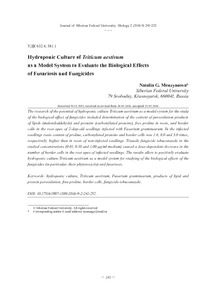Hydroponic Culture of Triticum aestivum as a Model System to Evaluate the Biological Effects of Fusariosis and Fungicides
Скачать файл:
URI (для ссылок/цитирований):
https://elib.sfu-kras.ru/handle/2311/32942Автор:
Menzyanova, N. G.
Коллективный автор:
Институт фундаментальной биологии и биотехнологии
Кафедра медицинской биологии
Дата:
2016-05Журнал:
Journal of Siberian Federal UniversityБиблиографическое описание:
Menzyanova, N. G. Hydroponic Culture of Triticum aestivum as a Model System to Evaluate the Biological Effects of Fusariosis and Fungicides [Текст] / N. G. Menzyanova // Journal of Siberian Federal University: Biology. — 2016. — Т. 9 (№ 2). — С. 241-252Текст статьи не публикуется в открытом доступе в соответствии с политикой журнала.
Аннотация:
The research of the potential of hydroponic culture Triticum aestivum as a model system for the study
of the biological effect of fungicides included determination of the content of peroxidation products
of lipids (malondialdehyde) and proteins (carbonylated proteins), free proline in roots, and border
cells in the root apex of 2-day-old seedlings infected with Fusarium graminearum. In the infected
seedlings roots content of proline, carbonylated proteins and border cells was 1.4; 8.0 and 3.0 times,
respectively, higher than in roots of non-infected seedlings. Triazole fungicide tebuconazole in the
studied concentrations (0.01, 0.10 and 1.00 µg/ml medium) caused a dose-dependent decrease in the
number of border cells in the root apex of infected seedlings. The results allow to positively evaluate
hydroponic culture Triticum aestivum as a model system for studying of the biological effects of the
fungicides (in particular, their phytotoxicity) and fusariosis.

